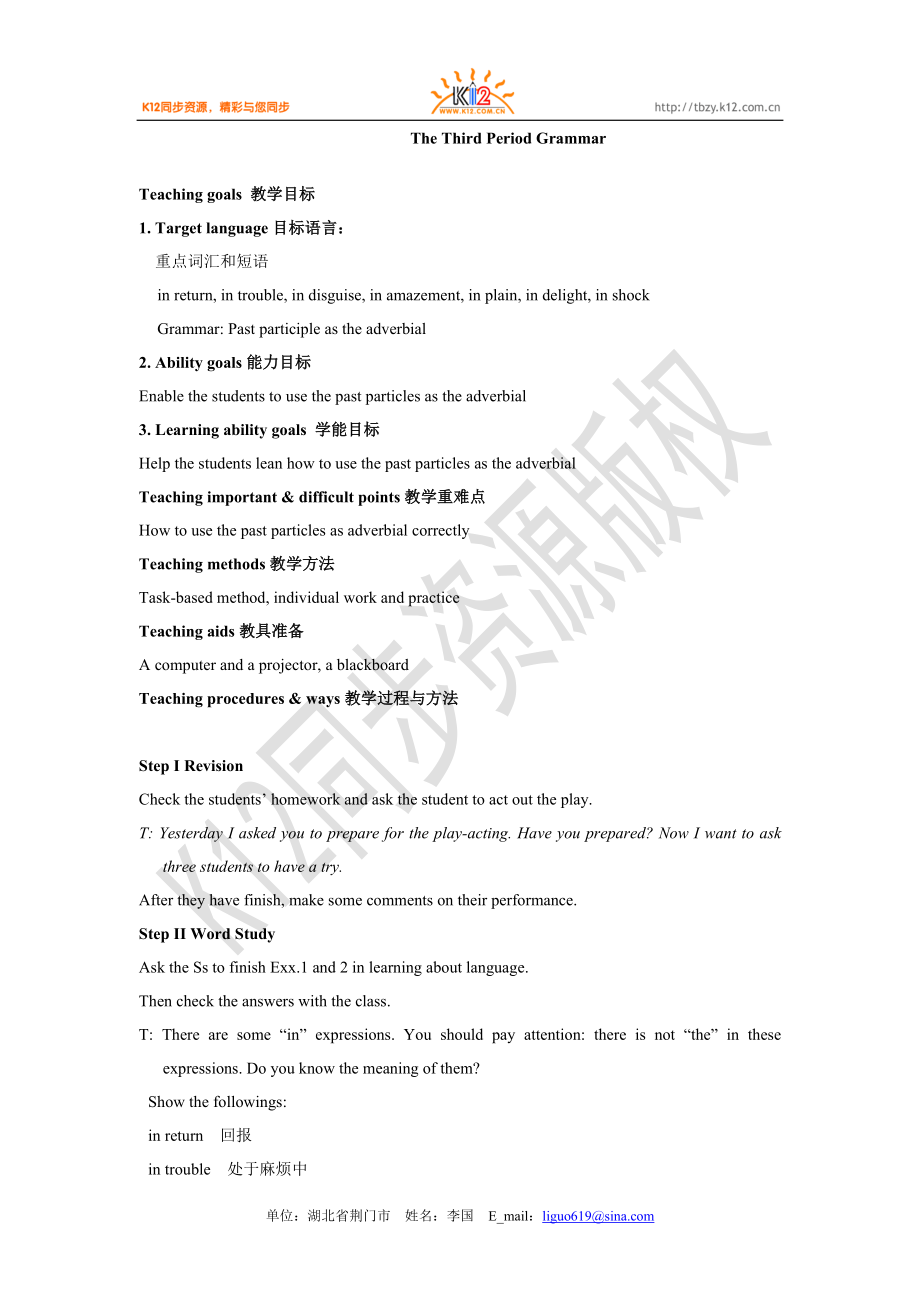《高二英語(yǔ)(選修八)unit 4 課時(shí)教案 The Third Period Grammar》由會(huì)員分享�����,可在線閱讀�,更多相關(guān)《高二英語(yǔ)(選修八)unit 4 課時(shí)教案 The Third Period Grammar(3頁(yè)珍藏版)》請(qǐng)?jiān)谘b配圖網(wǎng)上搜索。
1�、
The Third Period Grammar
Teaching goals 教學(xué)目標(biāo)
1. Target language目標(biāo)語(yǔ)言:
重點(diǎn)詞匯和短語(yǔ)
in return, in trouble, in disguise, in amazement, in plain, in delight, in shock
Grammar: Past participle as the adverbial
2. Ability goals能力目標(biāo)
Enable the students to use the past particles as the adverbial
3. L
2、earning ability goals 學(xué)能目標(biāo)
Help the students lean how to use the past particles as the adverbial
Teaching important & difficult points教學(xué)重難點(diǎn)
How to use the past particles as adverbial correctly
Teaching methods教學(xué)方法
Task-based method, individual work and practice
Teaching aids教具準(zhǔn)備
A computer an
3����、d a projector, a blackboard
Teaching procedures & ways教學(xué)過(guò)程與方法
Step I Revision
Check the students’ homework and ask the student to act out the play.
T: Yesterday I asked you to prepare for the play-acting. Have you prepared? Now I want to ask three students to have a try.
After they have fini
4�、sh, make some comments on their performance.
Step II Word Study
Ask the Ss to finish Exx.1 and 2 in learning about language.
Then check the answers with the class.
T: There are some “in” expressions. You should pay attention: there is not “the” in these expressions. Do you know the meaning of th
5、em?
Show the followings:
in return 回報(bào)
in trouble 處于麻煩中
in disguise 偽裝
in amazement 驚愕
in pain 痛苦地
in delight 高興地
in shock 震驚地
Step III Grammar
First ask the students to find out the examples of the past participle as the adverbial in the play.
Sample sentences:
1. An expert in pho
6�、netics, convinced that the quality of a person’s English decides his/her position in society. P28
2. But, sir, (proudly) once educated to speak properly, the girl could pass herself off in three months as a duchess at an ambassador’s garden party. P30
Explanations:
T: The past participle as the a
7、dverbial is a very important grammar, and it can indicate time, condition, reason, and way. We can add when/while/if or other conjunctions before the past participle in order to make the meaning more clearly. For example:
Show the following:
If bitten by a snake, you should send for help and don’t
8����、 walk.
The room, although supposed to be kept locked, was often left open.
T: Now please look at the following examples. Can you rewrite these sentences?
Show the following
1. Given more time, we could do it better(When / If…)
2. Heated to a high temperature, water will change to vapor. (When /
9、 If…)
3. Frightened by the noise in the night, the girl did not dare sleep in her room. (As…)
4. Disturbed by the noise, we had not finishes the meeting early. (As…)
5. She walked out of the house, followed by her little daughter.(…, and…)
Step IV Practice (Using Structures in Workbook)
Ask the
10����、 Ss to finish Part 2 and part3 on page 33.
If time permits, continue Exercise designed for practice of past participle as the adverbial in workbook.
Step V Homework
Ask the students to do the followings.
1. Finish the Exercise in work book and supplement material on grammar
2. Preview the reading materials in Using Language
單位:湖北省荊門(mén)市 姓名:李國(guó) E_mail:liguo619@
 高二英語(yǔ)(選修八)unit 4 課時(shí)教案 The Third Period Grammar
高二英語(yǔ)(選修八)unit 4 課時(shí)教案 The Third Period Grammar

